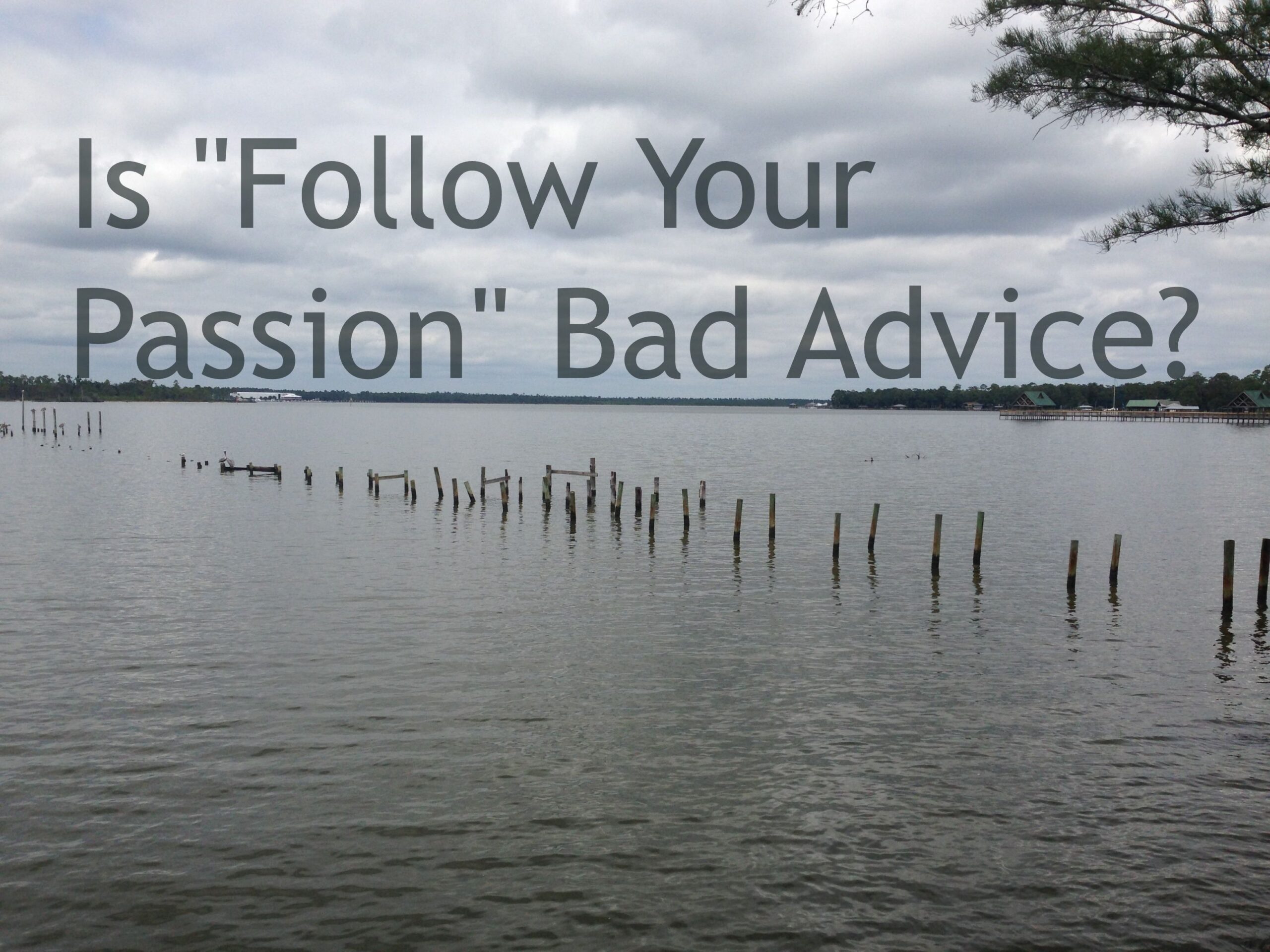Should you follow your passion or not? In my talks I often state two things: 1) the most successful people have passion for what they do and 2) to find the best work for you find ways to connect the work you love to money. After the talk, some will mention authors that argue against the “find your passion” mantra. For example, Mike Rowe of Dirty Jobs tells people that “finding your passion is terrible advice.” Another who talk against finding passion is Scott Adams, author of the Dilbert Cartoon Series. And of course my own friends and clients often challenge these ideas. Recently Rusty Hyde of Hyde Engineering challenged the “follow your passion” thinking. With so many smart people challenging this thinking, I thought perhaps it was time to look into my message.
[featured-image single_newwindow=”false”]
Click to Listen
[powerpress]
Did I Say That?
I was trying to find out where I tell people to follow their passion. While I am sure I have used those words, what I usually do is tell them to find their calling – which is a mixture of passion, skills, and market demand. Perhaps my talk about calling is misunderstood for the simple “follow your passion” advice. That is fair since so many tout the “follow your passion” mantra. Perhaps they are translating my message to “follow your passion.” Fair enough.
Why is Follow Your Passion Bad Career Advice?
So what is wrong with simply following your passion? The word “follow” implies someone is leading. Since it is your passion, it is YOU who must lead. And there is the problem. Leadership takes effort and work. It is not sit and think without action. Sit and think is fine, but if you are still sitting and thinking months later, you need to get moving.
But, passion is hardly a bad thing. There are plenty of examples of people finding a passion and let it drive them (even if they have no great skill) as well as others who find something to be passionate about in what they do. Some start with passion and others discover passion.
The trouble is that “follow your passion” is often an excuse for inaction due to laziness and/or fear. Instead of acting, they wait to discover. And wait, and wait, and wait.
Calling is Real
Cal Newport in his new book So Good They Can’t Ignore You, mentions “research” which indicates most people do not have preexisting passions. That is crazy. We all have things we are passionate about. What Cal is “discovering” is that most people cannot see their passion. They are blind to it. I have had hundreds of conversations with clients who say they do not have passion about anything, only to discover their eyes lighting up a few minutes later what I lead them to talk about their passion.
The problem is not lack of passion, the problem is lack of thinking and action. We are so stuck in thinking about “jobs” that we have a limited view of how we might connect our passion to money. For instance, I met with a lady who is a bookkeeper the other day who could not find her calling. She later explained how she loved yard work, flowers, plants, and all things about making your yard look beautiful. She explained she was not willing to start a company doing this kind of work. She also did not have the depth of experience needed to get a job in these areas.
I asked her if she had thought of doing bookkeeping for a landscaping or horticultural services company. She had never thought of that. She could connect her passion to her skill. Why do we not see these opportunities? Partly because we are not taught to think. We are taught to follow directions. So our passions lay lifeless while we find work that pays.
Execution is Key
You might think I am arguing against Scott, Mike, and Cal. This is hardly the case. In fact, if you read on in their material you will find they are not against passion, but perhaps more against excuses. But when the soundbyte is delivered, it sounds like Scott, Mike, and Cal are suggesting we should all hate out jobs. Hardly the case. Those who argue against “follow your passion” are really saying that we need to be willing to WORK.
Passion can be chased, discovered, propel us, etc. – but execution is the key.
I might be tempted to say “Let you passion drive you.” or “Your passion can help you find your calling.” or many other pithy statements, I will avoid doing so.
Instead I will just say, finding work that is meaningful to you takes a mixture of many things, but action is the one ingredient that must be part of the equation. Passion without action is just a bunch of hot air.
“Passion without action is just a bunch of hot air.”]
Your Calling or Your Passion?
Want to explore ideas you might want to act on? Learn how to find your calling so you too can find ways to make money and create your own new normal.
Subscription Links
If you have enjoyed this podcast, please subscribe to it on iTunes. To subscribe, go to iTunes and hit subscribe! You may have to click the button that says, “OPEN IN ITUNES.” You can also find Company of One on Stitcher.
Your Feedback
If you have an idea for a podcast you would like to see or a question about an upcoming episode, e-mail me.
Also, if you enjoyed the show, please rate it on iTunes and write a brief review. That would help tremendously in getting the word out! Thanks.
[reminder]What do you think? Is “find your passion” bad advice?[/reminder]








Dale, I think this is a great message, which is why I appreciate your Free ebook “How to Find Your Calling”. It really inspired me to think about a calling being more than just a job. I think this podcast is a perfect compliment to the ebook because it is a call to action. After all, not all passions can generate enough income to become careers. That doesn’t necessarily mean a person shouldn’t follow their passion, but that they might need to think twice before quitting their day job to pursue it. A few months ago I listened to a podcast by Michael Hyatt on “How to Discern Your Calling” and why passion alone isn’t enough. In it he mentions three things to determine your calling:
1)Passion – What do you love doing or learning about?
2)Proficiency – What are you good at? And have others said that you’re good at it too?
3)Profitability – Is there a market for what you’re passionate about AND good at?
Next Hyatt says that your calling is at the intersection of these 3 things. It’s like a Venn diagram with those 3 topics as circles and your calling is where the circles intersect.
I also really liked the podcast you did on obtaining Clarity a few weeks ago. Great stuff!
Thanks Servante – Perfect – a mix of some more than one thing. Not always simple.